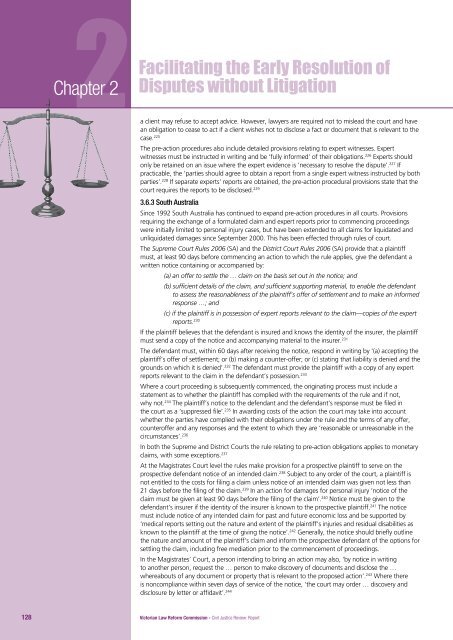Facilitating the Early Resolution of Disputes without Litigation
Facilitating the Early Resolution of Disputes without Litigation
Facilitating the Early Resolution of Disputes without Litigation
You also want an ePaper? Increase the reach of your titles
YUMPU automatically turns print PDFs into web optimized ePapers that Google loves.
Chapter 2<strong>Facilitating</strong> <strong>the</strong> <strong>Early</strong> <strong>Resolution</strong> <strong>of</strong><strong>Disputes</strong> <strong>without</strong> <strong>Litigation</strong>a client may refuse to accept advice. However, lawyers are required not to mislead <strong>the</strong> court and havean obligation to cease to act if a client wishes not to disclose a fact or document that is relevant to <strong>the</strong>case. 225The pre-action procedures also include detailed provisions relating to expert witnesses. Expertwitnesses must be instructed in writing and be ‘fully informed’ <strong>of</strong> <strong>the</strong>ir obligations. 226 Experts shouldonly be retained on an issue where <strong>the</strong> expert evidence is ’necessary to resolve <strong>the</strong> dispute’. 227 Ifpracticable, <strong>the</strong> ‘parties should agree to obtain a report from a single expert witness instructed by bothparties’. 228 If separate experts’ reports are obtained, <strong>the</strong> pre-action procedural provisions state that <strong>the</strong>court requires <strong>the</strong> reports to be disclosed. 2293.6.3 South AustraliaSince 1992 South Australia has continued to expand pre-action procedures in all courts. Provisionsrequiring <strong>the</strong> exchange <strong>of</strong> a formulated claim and expert reports prior to commencing proceedingswere initially limited to personal injury cases, but have been extended to all claims for liquidated andunliquidated damages since September 2000. This has been effected through rules <strong>of</strong> court.The Supreme Court Rules 2006 (SA) and <strong>the</strong> District Court Rules 2006 (SA) provide that a plaintiffmust, at least 90 days before commencing an action to which <strong>the</strong> rule applies, give <strong>the</strong> defendant awritten notice containing or accompanied by:(a) an <strong>of</strong>fer to settle <strong>the</strong> … claim on <strong>the</strong> basis set out in <strong>the</strong> notice; and(b) sufficient details <strong>of</strong> <strong>the</strong> claim, and sufficient supporting material, to enable <strong>the</strong> defendantto assess <strong>the</strong> reasonableness <strong>of</strong> <strong>the</strong> plaintiff’s <strong>of</strong>fer <strong>of</strong> settlement and to make an informedresponse …; and(c) if <strong>the</strong> plaintiff is in possession <strong>of</strong> expert reports relevant to <strong>the</strong> claim—copies <strong>of</strong> <strong>the</strong> expertreports. 230If <strong>the</strong> plaintiff believes that <strong>the</strong> defendant is insured and knows <strong>the</strong> identity <strong>of</strong> <strong>the</strong> insurer, <strong>the</strong> plaintiffmust send a copy <strong>of</strong> <strong>the</strong> notice and accompanying material to <strong>the</strong> insurer. 231The defendant must, within 60 days after receiving <strong>the</strong> notice, respond in writing by ‘(a) accepting <strong>the</strong>plaintiff’s <strong>of</strong>fer <strong>of</strong> settlement; or (b) making a counter-<strong>of</strong>fer; or (c) stating that liability is denied and <strong>the</strong>grounds on which it is denied’. 232 The defendant must provide <strong>the</strong> plaintiff with a copy <strong>of</strong> any expertreports relevant to <strong>the</strong> claim in <strong>the</strong> defendant’s possession. 233Where a court proceeding is subsequently commenced, <strong>the</strong> originating process must include astatement as to whe<strong>the</strong>r <strong>the</strong> plaintiff has complied with <strong>the</strong> requirements <strong>of</strong> <strong>the</strong> rule and if not,why not. 234 The plaintiff’s notice to <strong>the</strong> defendant and <strong>the</strong> defendant’s response must be filed in<strong>the</strong> court as a ‘suppressed file’. 235 In awarding costs <strong>of</strong> <strong>the</strong> action <strong>the</strong> court may take into accountwhe<strong>the</strong>r <strong>the</strong> parties have complied with <strong>the</strong>ir obligations under <strong>the</strong> rule and <strong>the</strong> terms <strong>of</strong> any <strong>of</strong>fer,counter<strong>of</strong>fer and any responses and <strong>the</strong> extent to which <strong>the</strong>y are ‘reasonable or unreasonable in <strong>the</strong>circumstances’. 236In both <strong>the</strong> Supreme and District Courts <strong>the</strong> rule relating to pre-action obligations applies to monetaryclaims, with some exceptions. 237At <strong>the</strong> Magistrates Court level <strong>the</strong> rules make provision for a prospective plaintiff to serve on <strong>the</strong>prospective defendant notice <strong>of</strong> an intended claim. 238 Subject to any order <strong>of</strong> <strong>the</strong> court, a plaintiff isnot entitled to <strong>the</strong> costs for filing a claim unless notice <strong>of</strong> an intended claim was given not less than21 days before <strong>the</strong> filing <strong>of</strong> <strong>the</strong> claim. 239 In an action for damages for personal injury ‘notice <strong>of</strong> <strong>the</strong>claim must be given at least 90 days before <strong>the</strong> filing <strong>of</strong> <strong>the</strong> claim’. 240 Notice must be given to <strong>the</strong>defendant’s insurer if <strong>the</strong> identity <strong>of</strong> <strong>the</strong> insurer is known to <strong>the</strong> prospective plaintiff. 241 The noticemust include notice <strong>of</strong> any intended claim for past and future economic loss and be supported by‘medical reports setting out <strong>the</strong> nature and extent <strong>of</strong> <strong>the</strong> plaintiff’s injuries and residual disabilities asknown to <strong>the</strong> plaintiff at <strong>the</strong> time <strong>of</strong> giving <strong>the</strong> notice’. 242 Generally, <strong>the</strong> notice should briefly outline<strong>the</strong> nature and amount <strong>of</strong> <strong>the</strong> plaintiff’s claim and inform <strong>the</strong> prospective defendant <strong>of</strong> <strong>the</strong> options forsettling <strong>the</strong> claim, including free mediation prior to <strong>the</strong> commencement <strong>of</strong> proceedings.In <strong>the</strong> Magistrates’ Court, a person intending to bring an action may also, ‘by notice in writingto ano<strong>the</strong>r person, request <strong>the</strong> … person to make discovery <strong>of</strong> documents and disclose <strong>the</strong> …whereabouts <strong>of</strong> any document or property that is relevant to <strong>the</strong> proposed action’. 243 Where <strong>the</strong>reis noncompliance within seven days <strong>of</strong> service <strong>of</strong> <strong>the</strong> notice, ‘<strong>the</strong> court may order … discovery anddisclosure by letter or affidavit’. 244128Victorian Law Reform Commission - Civil Justice Review: Report
















